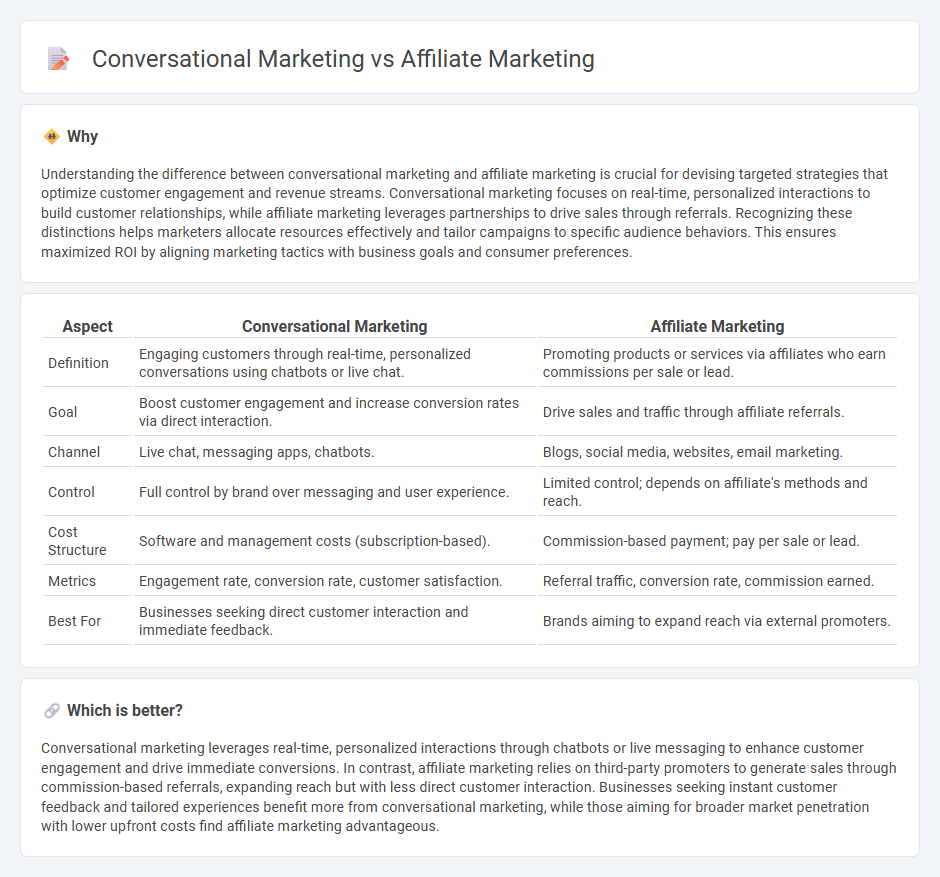
Conversational marketing leverages real-time, personalized interactions via chatbots and messaging apps to engage customers and drive sales, enhancing user experience and boosting conversion rates. Affiliate marketing focuses on partnering with influencers or affiliates who promote products or services in exchange for commission-based rewards, expanding brand reach through a performance-driven model. Explore the distinct advantages and strategies of conversational and affiliate marketing to optimize your marketing efforts.
Why it is important
Understanding the difference between conversational marketing and affiliate marketing is crucial for devising targeted strategies that optimize customer engagement and revenue streams. Conversational marketing focuses on real-time, personalized interactions to build customer relationships, while affiliate marketing leverages partnerships to drive sales through referrals. Recognizing these distinctions helps marketers allocate resources effectively and tailor campaigns to specific audience behaviors. This ensures maximized ROI by aligning marketing tactics with business goals and consumer preferences.
Comparison Table
| Aspect | Conversational Marketing | Affiliate Marketing |
|---|---|---|
| Definition | Engaging customers through real-time, personalized conversations using chatbots or live chat. | Promoting products or services via affiliates who earn commissions per sale or lead. |
| Goal | Boost customer engagement and increase conversion rates via direct interaction. | Drive sales and traffic through affiliate referrals. |
| Channel | Live chat, messaging apps, chatbots. | Blogs, social media, websites, email marketing. |
| Control | Full control by brand over messaging and user experience. | Limited control; depends on affiliate's methods and reach. |
| Cost Structure | Software and management costs (subscription-based). | Commission-based payment; pay per sale or lead. |
| Metrics | Engagement rate, conversion rate, customer satisfaction. | Referral traffic, conversion rate, commission earned. |
| Best For | Businesses seeking direct customer interaction and immediate feedback. | Brands aiming to expand reach via external promoters. |
Which is better?
Conversational marketing leverages real-time, personalized interactions through chatbots or live messaging to enhance customer engagement and drive immediate conversions. In contrast, affiliate marketing relies on third-party promoters to generate sales through commission-based referrals, expanding reach but with less direct customer interaction. Businesses seeking instant customer feedback and tailored experiences benefit more from conversational marketing, while those aiming for broader market penetration with lower upfront costs find affiliate marketing advantageous.
Connection
Conversational marketing leverages real-time dialogue to engage potential customers, creating personalized experiences that boost conversion rates. Affiliate marketing relies on partners promoting products through targeted content, often integrating conversational tools like chatbots or messaging apps to facilitate direct interactions. Combining these strategies enhances customer trust and drives higher affiliate sales by fostering authentic, immediate communication within marketing funnels.
Key Terms
Affiliate marketing:
Affiliate marketing leverages partnerships where affiliates earn commissions by promoting products through tracked links, driving targeted traffic and boosting sales effectively. It relies heavily on performance metrics like click-through rates and conversion rates to optimize campaign success and maximize ROI. Explore deeper insights and strategies to elevate your affiliate marketing efforts now.
Commission
Affiliate marketing hinges on earning commissions by promoting products or services and driving sales through tracked referral links. Conversational marketing emphasizes real-time, personalized interactions to guide prospects toward purchases, often integrating chatbots or live chats rather than relying primarily on commissions. Explore more about how these marketing strategies impact revenue and conversion metrics for your business.
Referral
Affiliate marketing leverages third-party partners to promote products, earning commissions based on referrals and driving measurable sales performance. Conversational marketing uses real-time, personalized interactions via chatbots or live agents to engage prospects and nurture referrals through direct conversation. Explore the nuances of referral strategies in both methods to maximize customer acquisition and retention.
Source and External Links
Affiliate Marketing 101: What it is and How to Get Started - Affiliate marketing is a process where affiliates earn commissions by promoting products or services created by sellers, involving three parties: the seller, the affiliate, and the consumer, with affiliates targeting specific audiences to drive sales.
Affiliate Marketing Guide: All You Need To Know (2025) - Affiliate marketing is a performance-based strategy where affiliates earn commissions for promoting products via unique tracking links, rewarding actions like sales, sign-ups, or downloads, and beginners can start by choosing a niche, platform, and relevant programs to build an audience.
Amazon Associates Central - Amazon's affiliate program enables content creators and publishers to monetize traffic by sharing Amazon product links and earning up to 10% commissions on qualifying purchases and other customer actions, with support for bloggers and social media influencers alike.
 dowidth.com
dowidth.com